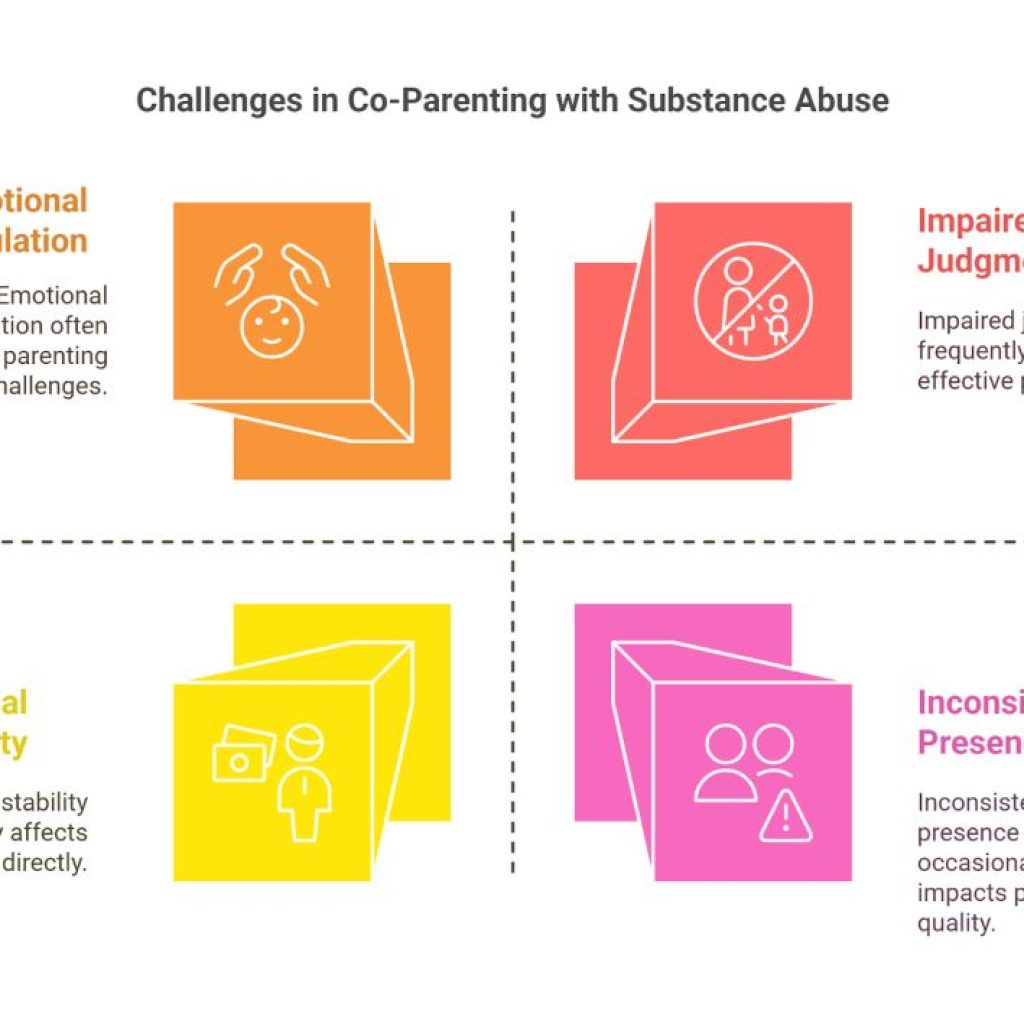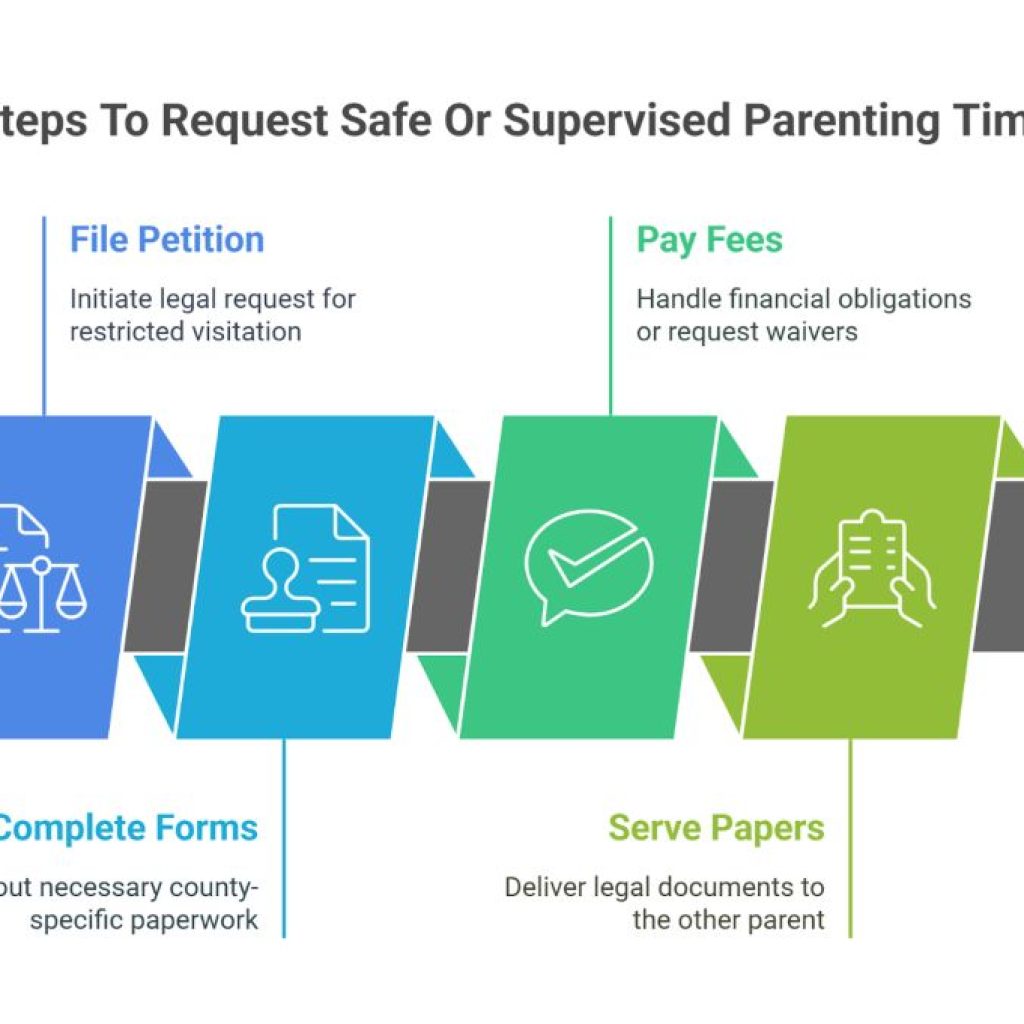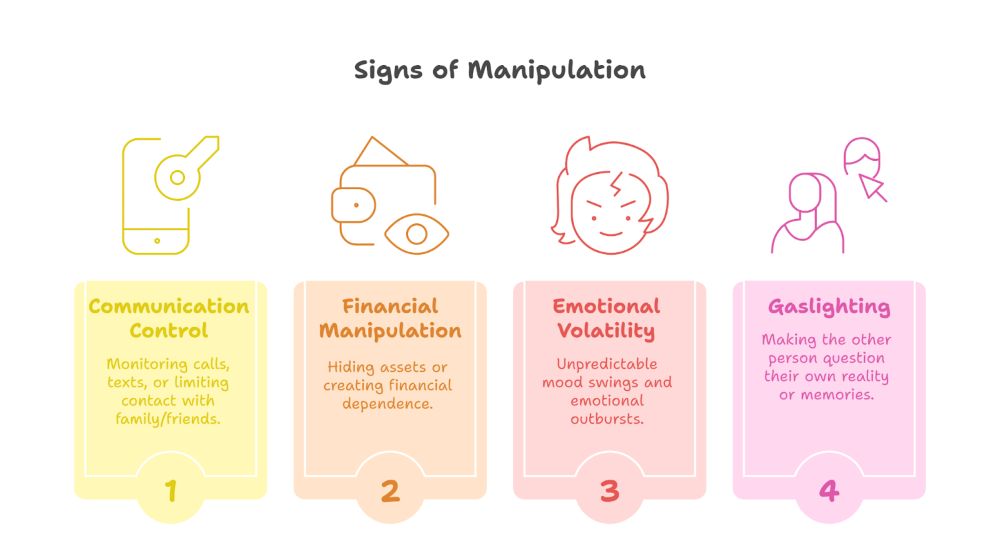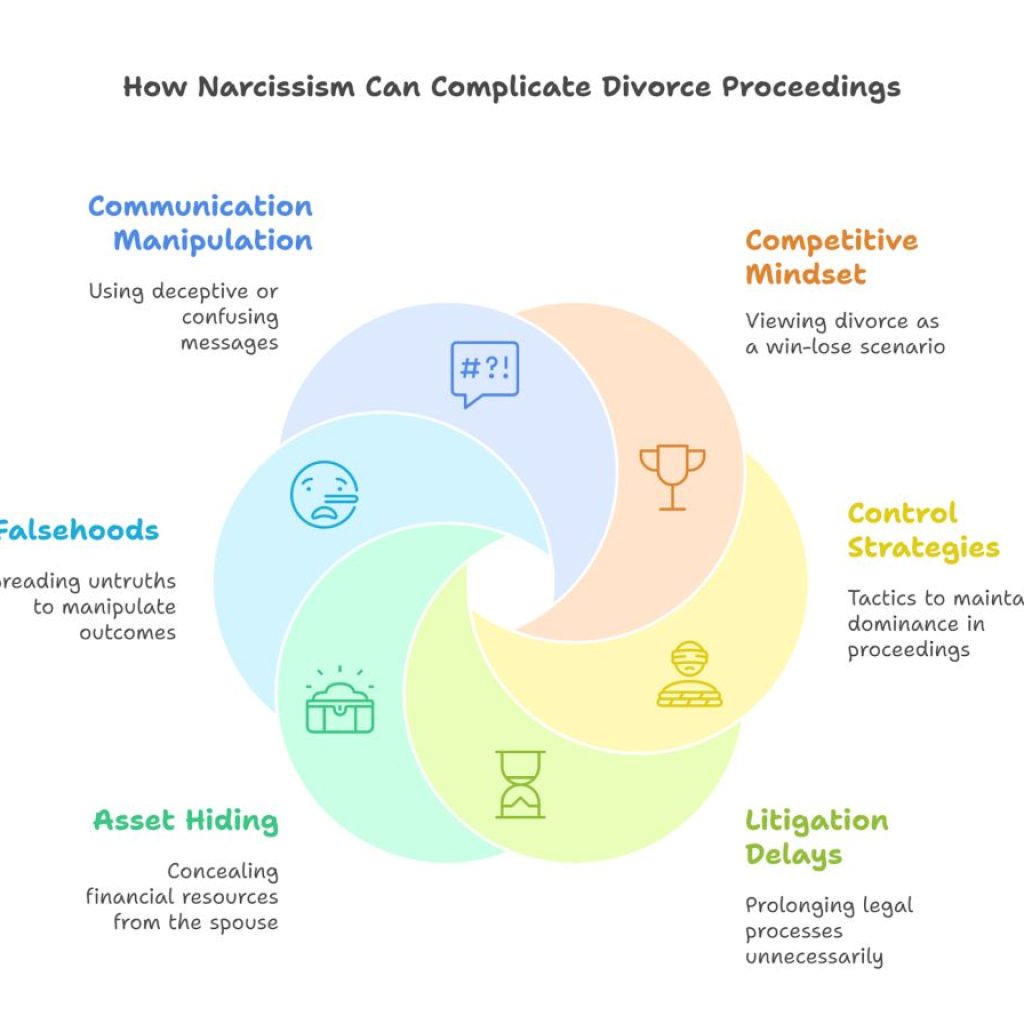Living with a spouse struggling with addiction often feels like an emotional rollercoaster with no end in sight. The daily unpredictability, broken promises, and financial strain can leave families feeling hopeless and exhausted.
Many people stay in these difficult situations far longer than they should, hoping things will change.
Divorcing a spouse with addiction issues comes with unique challenges that require specialized legal and emotional support to navigate effectively.
When substance abuse enters a marriage, it fundamentally changes the dynamics around child custody, financial decisions, and even basic safety considerations.
Data shows that more than 7% of divorces occur due to substance abuse issues, making it a significant factor in family breakdown.
The effects of addiction are felt by the entire family, especially children who may face long-term emotional impacts.
While ending a marriage is never easy, when addiction is involved, having the right resources and support can make the difference between a chaotic separation and one that provides a foundation for healing and moving forward.
Key Takeaways
- Legal guidance is essential when navigating divorce with an addicted spouse, particularly for addressing complex custody and asset division issues.
- Documentation of addiction-related incidents and behaviors provides critical evidence that can protect your interests and your children’s well-being during proceedings.
- Creating a support network of mental health professionals, support groups, and trusted friends helps maintain emotional stability throughout the challenging divorce process.
Understanding The Link Between Addiction And Divorce
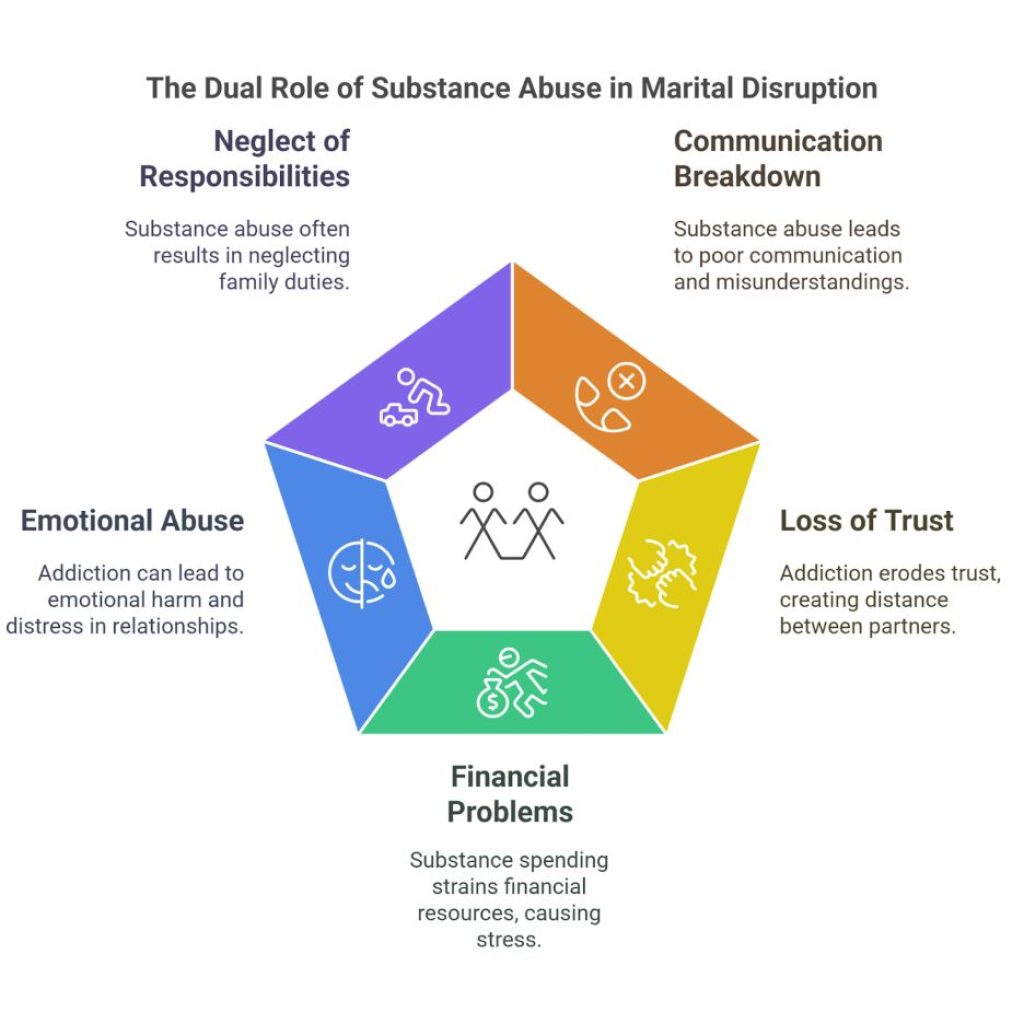
Addiction and divorce are often intertwined in complex ways that create significant strain on marriages.
The presence of substance abuse can erode trust, change behavior patterns, and create financial instability that threatens even previously strong relationships.
Substance Abuse And Marital Breakdown: What The Data Shows
In the United States, approximately 45% of marriages end in divorce, with substance abuse playing a significant role in these statistics.
Research indicates that more than 7% of divorces occur due to substance abuse issues, making addiction a notable factor in marital dissolution.
Studies have found that rates of drug abuse are higher among divorced individuals compared to those who remain married.
However, this correlation raises questions about cause and effect—does addiction lead to divorce, or does divorce potentially trigger substance abuse?
The evidence suggests both scenarios occur. Addiction can create patterns of dishonesty, financial strain, and emotional distance that damage marital bonds beyond repair. Substance abuse often leads to:
- Breakdown in communication
- Loss of trust and intimacy
- Financial problems from spending on substances
- Emotional or physical abuse
- Neglect of family responsibilities
Types Of Addictions That Impact Divorce Cases
While alcohol and drug addictions commonly influence divorce proceedings, they aren’t the only dependencies that can destroy marriages.
Behavioral addictions such as gambling and sex addiction also frequently contribute to marital breakdown.
Different types of addiction present unique challenges in divorce cases:
Chemical Dependencies:
- Alcohol addiction (most common)
- Prescription drug abuse
- Illegal substance use (methamphetamine, cocaine, heroin)
Behavioral Addictions:
- Gambling addiction (creating financial devastation)
- Sex or pornography addiction (destroying intimacy and trust)
- Gaming or internet addiction (leading to neglect of relationship)
The effects of substance use disorders are felt by the entire family, often creating environments of unpredictability and stress.
Children are particularly vulnerable to these impacts, which can influence custody decisions in divorce proceedings.
Legal professionals note that divorcing a person with an addiction involves unique complexities regarding custody, asset division, and safety concerns. These cases typically require specialized legal guidance to navigate effectively.
How Illinois Law Treats Addiction In Divorce Cases
Illinois divorce cases involving substance abuse present unique legal challenges. Courts consider addiction’s impact on family stability, financial security, and child welfare when making important decisions about property division and parental responsibilities.
Addiction And Grounds For Divorce In Illinois
Illinois operates as a “no-fault” divorce state, meaning couples can divorce citing “irreconcilable differences” without proving misconduct.
However, substance abuse problems can complicate the process significantly.
While addiction itself isn’t an explicit ground for divorce, its consequences often create legitimate legal concerns. Courts examine how substance abuse affects:
- Financial stability (spending family funds on drugs/alcohol)
- Emotional well-being of family members
- Physical safety concerns
- Ability to maintain employment
Judges take addiction particularly seriously when children are involved. A history of alcohol or drug abuse can impact child custody decisions dramatically, often resulting in supervised visitation or required treatment programs before normal parenting time resumes.
Proving Addiction In Court: What You Need To Know
When divorcing a spouse with an addiction, documentation becomes crucial. Illinois courts require substantial evidence rather than mere accusations.
Effective evidence includes:
- Medical records showing substance-related treatments
- Police reports documenting incidents related to addiction
- Testimonies from witnesses who observed problematic behavior
- Results from court-ordered drug testing
- Financial records showing unusual spending patterns
It’s important to remember that addiction is considered a medical condition. The court’s primary concern is protecting vulnerable family members while encouraging treatment.
Many Illinois judges may order substance abuse evaluations and even mandate rehabilitation programs as part of the divorce process.
A spouse actively engaging in recovery may receive more favorable consideration regarding parenting time and financial matters.
Addiction doesn’t just affect your spouse—it impacts your entire family. Contact Cooper Trachtenberg Law Group today to schedule a private consultation with a family law attorney who understands complex situations.
If you’re ready to get started, call us now!
Protecting Children During Divorce From An Addicted Spouse
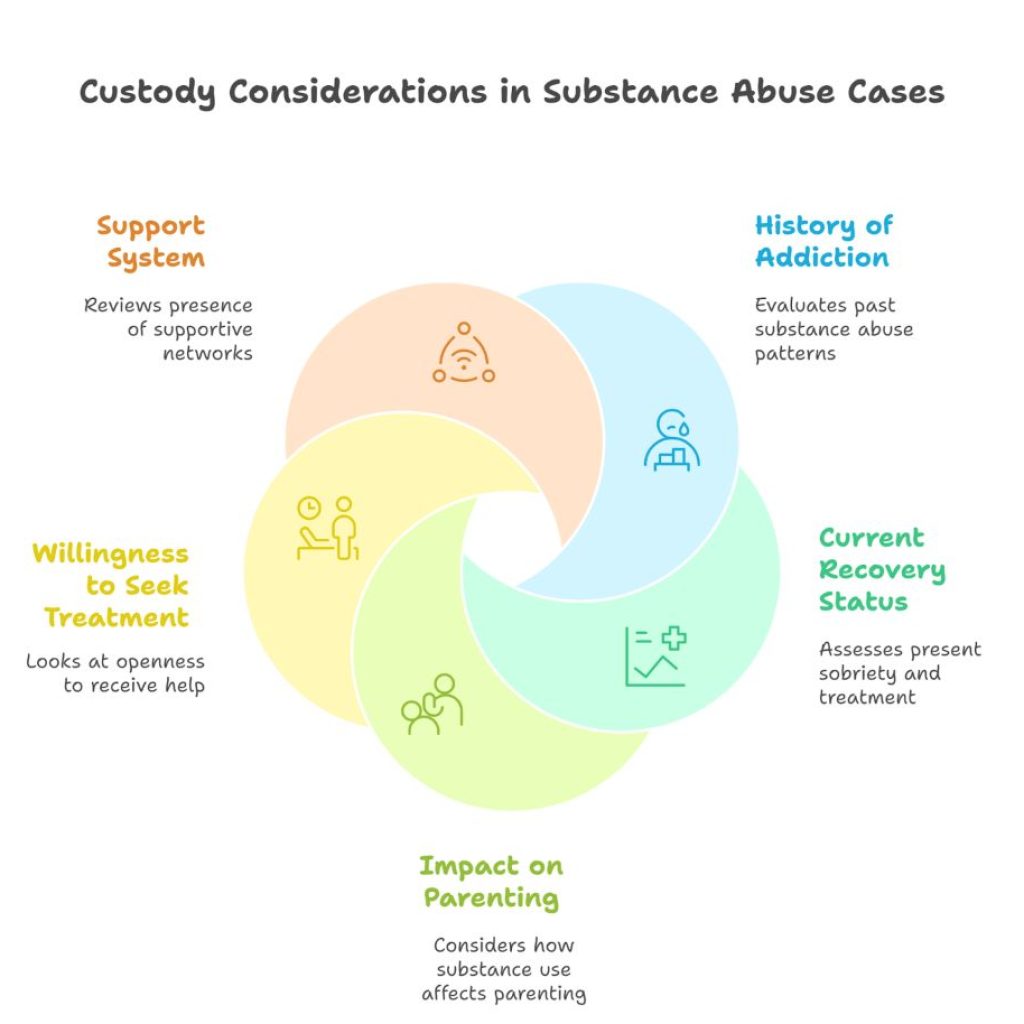
When divorcing a spouse with substance abuse issues, protecting your children becomes the top priority.
Courts examine parental fitness carefully, while parents must take specific steps to document concerns and create safe environments.
The Court’s Standard: “Best Interests Of The Child”
Family courts use the “best interests of the child” standard in Illinois and most states when making custody decisions.
When addiction is involved, judges look at how the substance abuse affects the parent’s ability to care for their children. Courts consider:
- History of addiction and current recovery status
- Impact of substance use on parenting abilities
- Willingness to seek treatment
- Existence of a support system
Courts often order evaluations by professionals to assess the situation. These may include psychological evaluations, substance abuse assessments, and home studies.
In Illinois, judges may order supervised visitation, drug testing, or completion of treatment programs before allowing unsupervised contact.
The disease of addiction creates environments of “secrecy, loss, conflict, violence or abuse, emotional chaos, role reversal, and fear” that courts recognize as harmful to children.
Can Addiction Terminate Parental Rights?
Addiction alone usually doesn’t terminate parental rights, but persistent substance abuse combined with other factors might. Courts consider:
Factors that may lead to termination:
- Severe neglect or abuse linked to addiction
- Multiple failed treatment attempts
- Ongoing legal problems related to substance use
- Consistent endangerment of children
- Refusal to participate in court-ordered services
Illinois courts typically give parents opportunities to address their addiction before considering termination of rights. The goal is usually reunification when safe and possible.
Parents struggling with addiction may receive modified parenting time with safety measures in place.
Courts prefer to maintain parent-child relationships when possible while protecting children from the chaos that often accompanies addiction.
Steps For Parents Seeking Sole Or Primary Custody
If you’re seeking custody due to your spouse’s addiction, documentation is critical. Here are the essential steps:
- Gather evidence of the addiction’s impact on parenting:
- Medical records
- Police reports
- Witness statements
- Text messages showing concerning behavior
- Establish stability in your home environment to show contrast.
- Work with professionals, including therapists for your children and a guardian ad litem if appointed.
Addiction often creates chaos beyond the individual, affecting the entire family. Consider requesting temporary orders for protection during proceedings if necessary.
Avoid speaking negatively about your co-parent to children. Instead, focus on creating routines and stability.
Consult with a family law attorney experienced in addiction cases, as they understand Illinois-specific laws regarding substance abuse and custody.
Key Legal Steps To Take
When divorcing a spouse with addiction issues, proper legal preparation can significantly impact the outcome of your case and protect your future.
Taking strategic steps with professional guidance can help navigate the complex intersection of addiction and family law.
Working With Your Attorney On A Legal Strategy
Finding an attorney with experience in addiction-related divorce cases should be your priority. Legal complexities arise regarding custody, asset division, and safety when addiction is involved, making specialized legal guidance essential.
Be completely honest with your attorney about the extent of your spouse’s addiction. This information helps them build an appropriate strategy for your situation.
Consider requesting specialized evaluations that may be admissible in court. These might include:
- Substance abuse assessments
- Psychological evaluations
- Parenting capacity evaluations
Discuss the possibility of requesting supervised visitation or mandatory treatment programs as part of custody arrangements if children are involved. Your attorney can help determine if pursuing fault-based divorce grounds related to substance abuse is advantageous in your state.
Why Documentation Is Critical In Addiction-Based Divorces
Courts require evidence to make determinations about how addiction has impacted your marriage.
Keep a detailed chronological record of addiction-related incidents, including:
- Dates and descriptions of concerning behavior
- Financial records showing money spent on substances
- Text messages or emails referencing the addiction
- Police reports or DUI records
- Medical records documenting addiction-related issues
- Witness statements from people who have observed problematic behavior
This documentation can significantly strengthen your case when addiction may affect your divorce outcome. It’s not about punishment but about demonstrating the reality of the situation to ensure fair resolution.
Consider organizing evidence into clear categories. This makes it easier for your attorney to present a compelling case about how the addiction has impacted family finances, parenting abilities, or safety concerns.
Financial Protection: Managing Joint Accounts & Assets
Addiction often leads to financial instability that can jeopardize your economic future. Taking immediate steps to protect your finances is crucial.
First steps to take:
- Open individual bank accounts in your name only
- Remove your name from joint credit accounts when possible
- Monitor credit reports regularly for unexpected activity
- Secure important financial documents and valuables
Consider consulting with a financial advisor who specializes in divorce. They can help identify how addiction can affect your divorce settlement through hidden spending or depleted assets.
If your spouse has accumulated addiction-related debt, discuss with your attorney how to protect yourself from liability.
In some cases, courts may consider addiction-related spending as “dissipation of marital assets” and adjust settlements accordingly.
Document any instances where family funds were used to support the addiction. This evidence can be critical in determining equitable distribution of assets and debts during divorce proceedings.
Feeling overwhelmed by the legal side of divorce and addiction? Schedule a confidential call with Cooper Trachtenberg Law Group to discuss your divorce options and protect your peace of mind.
If you’re ready to get started, call us now!
Emotional Preparedness And Mental Health Resources
Facing divorce when addiction is involved creates unique emotional challenges that require both personal preparation and professional support.
The journey involves processing complex feelings while finding resources that guide through this difficult transition.
Coping With Guilt, Fear, And Grief
Divorcing a spouse with addiction often triggers overwhelming emotions. Many people experience guilt about “abandoning” their partner during illness, even when the decision is necessary for safety and well-being. This guilt isn’t a sign of failure but a natural response to a painful situation.
Fear about the future is common too. Questions about financial stability, single parenting, or the ex-spouse’s well-being can create anxiety. It’s important to acknowledge these fears rather than suppress them.
Grief deserves special attention, as many experience loss on multiple levels – mourning the relationship, shared dreams, and the person their spouse might have been without addiction. This grief process requires time and patience.
Professional counselors specializing in both addiction and divorce can provide valuable guidance through these emotional stages.
Resources That Can Help Families Cope
Support groups offer a crucial connection with others who truly understand.
Individual therapy provides personalized emotional support. Look for therapists with experience in both substance abuse and family dynamics. Many offer sliding scale fees if cost is a concern.
For those with children, family therapy helps the entire household process changes together. Child-focused resources like books, support groups, and school counseling can provide age-appropriate assistance.
Legal aid services in many communities offer specialized help for divorcing an addicted spouse, combining practical guidance with emotional support.
Why Legal Representation Matters In These Cases
Divorcing a spouse with addiction creates unique legal challenges that require specialized knowledge and strategic planning.
Having skilled legal representation can make a critical difference in achieving fair outcomes for both you and your children.
Complex Custody Battles Require Strategic Advocacy
When addiction is involved in divorce cases, custody disputes become particularly complicated. Courts prioritize the best interests of children, and substance abuse significantly impacts parenting capacity evaluations.
A skilled divorce attorney for a spouse with addiction can present evidence of addiction in ways that protect children while being fair to all parties.
These attorneys understand how to request court-ordered testing, monitoring programs, and supervised visitation when appropriate. They can also advocate for reunification plans that include sobriety milestones and treatment compliance.
Family courts often require specialized documentation from addiction counselors or treatment facilities.
An experienced attorney knows which experts to consult and how their testimony can strengthen a case. This strategic advocacy is essential when navigating substance abuse in child custody cases.
How Cooper Trachtenberg Law Group Supports Families Through Addiction-Based Divorce
The Cooper Trachtenberg Law Group offers specialized support for clients facing divorce due to a spouse’s addiction. Their approach combines legal expertise with compassionate understanding of addiction’s impact on families.
Their attorneys recognize that addiction is a disease requiring treatment, not just punishment. This balanced perspective helps them negotiate arrangements that protect clients while acknowledging recovery possibilities.
For Chicago-area residents seeking the best divorce lawyer for addiction cases, Cooper Trachtenberg offers comprehensive services.
Their services include emergency protective orders when safety is at risk. They can also help document addiction-related financial waste and advocate for fair asset division despite addiction-related complications.
The firm maintains connections with local addiction specialists, therapists, and support groups to create a network of resources for clients during this difficult transition. This holistic approach addresses both immediate legal needs and long-term family healing.
If your spouse’s addiction is putting your child at risk, take the next step. Call Cooper Trachtenberg Law Group to schedule a custody consultation tailored to your family’s safety and needs.
Contact Us Today For An Appointment
Frequently Asked Questions
Can I divorce my spouse because of their addiction?
Yes.
In Illinois, you don’t need to prove fault, such as addiction, to get a divorce. However, substance abuse can impact decisions related to child custody, parenting time, and financial matters.
How does addiction affect child custody in Illinois?
Addiction can limit parental rights.
If a parent’s substance abuse threatens a child’s safety or well-being, Illinois courts may reduce or supervise their parenting time, or award sole custody to the other parent.
Do Illinois courts require proof of addiction during divorce?
Yes, if it’s influencing custody or safety.
Courts require credible evidence such as drug test results, medical records, police reports, or witness testimony when addiction is a factor in custody or visitation decisions.
Can a parent lose custody due to addiction?
Yes, in severe cases.
A parent may lose custody or face supervised visits if the addiction leads to neglect, abuse, or endangerment. Termination of parental rights may occur in extreme situations.
What legal protections can I request during a divorce from a person with an addiction?
You can request emergency orders.
Illinois courts may issue temporary orders for custody, restraining orders, drug testing, and financial protections to ensure safety during the divorce process.
What documentation helps in a divorce involving addiction?
Keep records of behavior and incidents.
Useful documentation includes texts, emails, rehab records, missed visitation logs, police reports, and any proof of drug use that supports your claims in court.
Should I consider mediation if my spouse struggles with addiction?
Mediation is usually not recommended.
If your spouse is actively abusing substances, mediation may not be safe or productive. Litigation may be a better path to protect yourself and your children legally.




